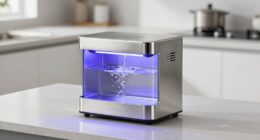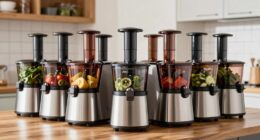Homemade orange juice lasts about 2 hours at room temperature before spoilage starts. If you refrigerate it, you can enjoy it for 2-3 days at 40°F (4°C) or lower. For longer storage, freezing the juice can keep it fresh for up to six months. Remember to use airtight containers and check for any off smells before drinking. Want to know more about how to store it or extend its shelf life? Just keep going!
Key Takeaways
- Freshly squeezed orange juice lasts about 2 hours at room temperature before spoilage begins.
- Refrigerated juice can last 2-3 days when stored at 40°F (4°C) or lower.
- Freezing orange juice extends its shelf life up to six months while retaining taste.
- Thawed juice should be consumed promptly for best quality after freezing.
- Proper storage in airtight containers reduces oxidation and helps maintain freshness.
Shelf Life of Homemade Orange Juice

When you make homemade orange juice, it's important to know how long it stays fresh. At room temperature, your freshly squeezed juice lasts about two hours before spoilage begins. Bacterial growth can occur rapidly, making it unsafe to drink after this short period.
On the other hand, when you refrigerate it at 40°F (4°C) or lower, your juice can last 2-3 days, helping to maintain its flavor and prevent bacteria. Refrigeration is recommended to slow spoilage and bacteria growth.
If you need to store it longer, freezing is your best bet; homemade orange juice can last up to six months in the freezer while retaining its taste. Just remember, once thawed, it should be consumed promptly for the best quality.
Storage Methods for Homemade Orange Juice
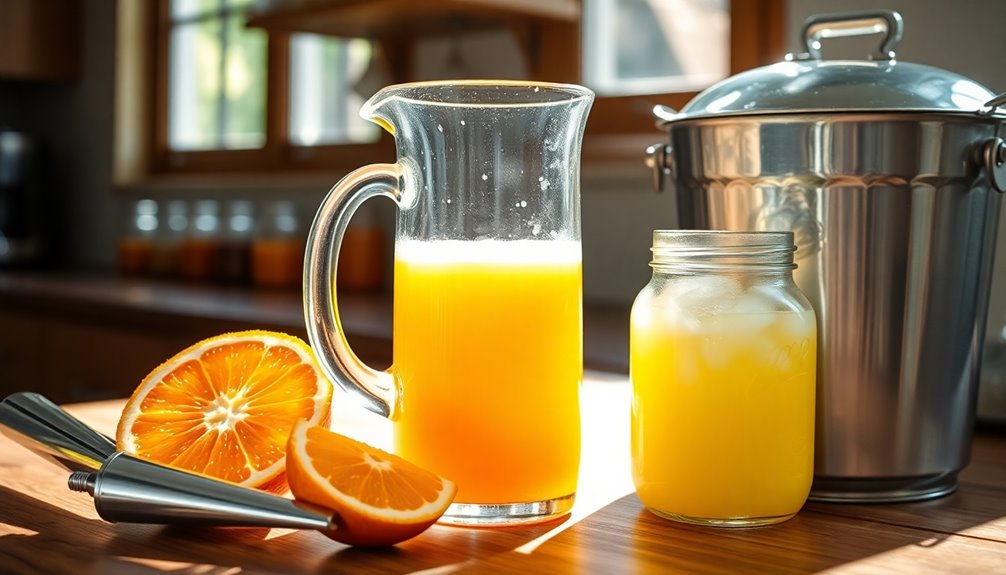
Knowing how to store your homemade orange juice properly can significantly extend its freshness and flavor.
For refrigeration, use airtight glass containers to minimize air exposure, and keep your fridge at 40°F (4°C) or lower. Be sure to label containers with the date and divide juice into smaller portions to reduce air contact. Fresh juice lasts 24 to 72 hours in the refrigerator, so consume it within this timeframe for optimal taste.
If you want to store it longer, freezing is an excellent option; just use freezer-safe containers and leave some space for expansion. Ice cube trays are great for portioning.
For even better preservation, consider vacuum sealing your juice to reduce oxidation.
Effects of Preservatives on Orange Juice
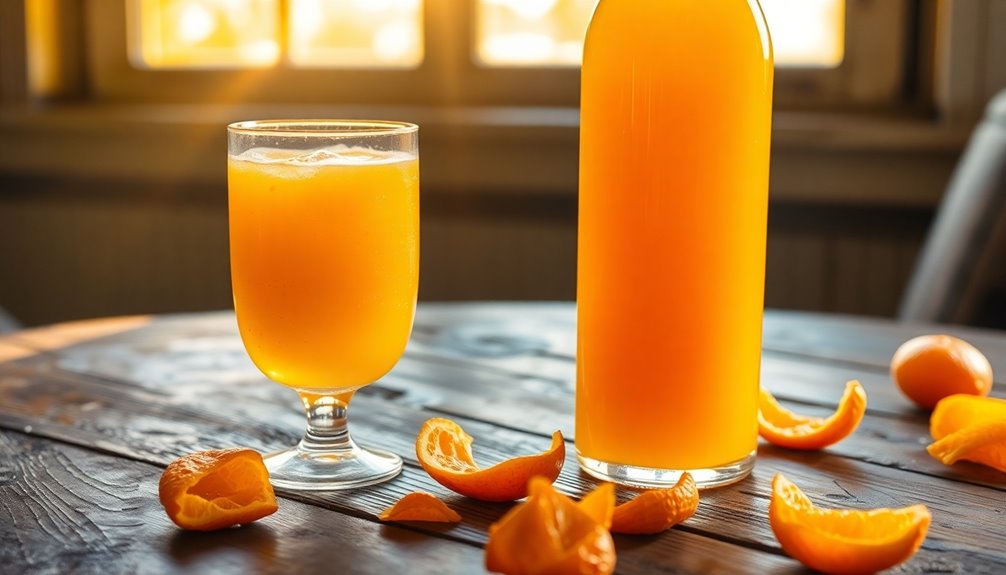
Preservatives play a crucial role in extending the shelf life of orange juice, ensuring you can enjoy its fresh flavor for longer. Common preservatives like sodium benzoate and benzoic acid significantly inhibit the growth of bacteria and yeast, giving your juice a longer lifespan compared to homemade varieties. Additionally, natural options like propolis help maintain quality without chemical additives. The concentration of these preservatives affects both the shelf life and the juice's overall quality, while proper storage conditions enhance their effectiveness. However, it's important to be mindful of consumption, as excessive intake of chemical preservatives may pose health risks. Citric acid also plays a vital role by balancing the pH of the juice, further contributing to its preservation. Incorporating these preservatives can help prevent nutrient loss in the juice over time.
Nutritional Content of Orange Juice
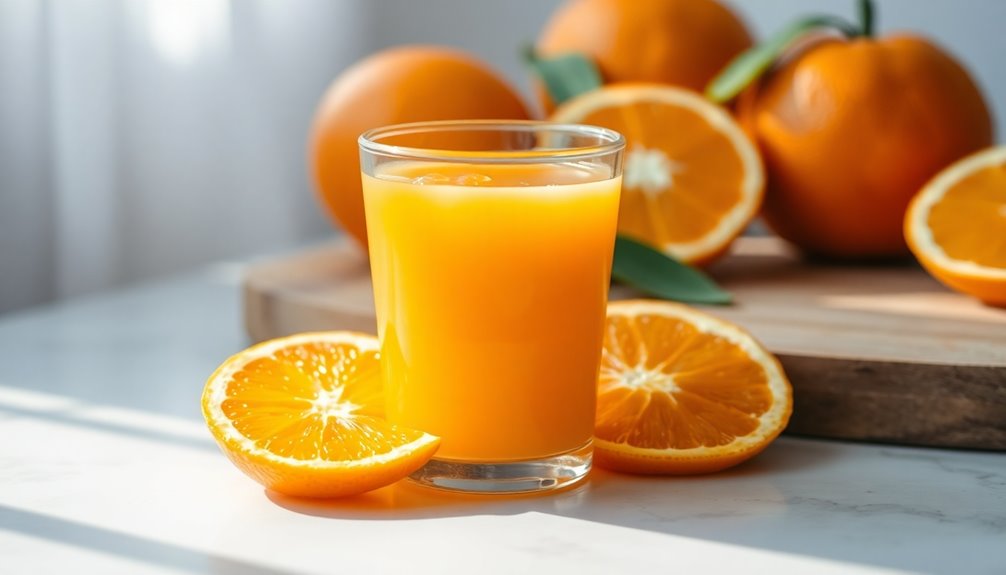
Orange juice is a popular beverage, prized not just for its refreshing taste but also for its impressive nutritional profile.
An 8-ounce serving packs about 110 calories and provides a whopping 137% of your daily vitamin C needs, crucial for immune support. You'll also get 11% of the recommended dietary intake for folate, which helps reduce birth defects, and 14% for potassium, essential for heart health. Plus, it offers 18% of your thiamine needs, vital for energy production. However, remember that orange juice has more sugar and fewer nutrients like fiber compared to whole oranges. Additionally, store-bought orange juice often undergoes processing that can lead to a loss of vitamins, so it's important to consider the source of your juice. If you're opting for juice, consider that some brands may include added sugars, so check the labels to choose wisely.
Safety Considerations for Homemade Orange Juice
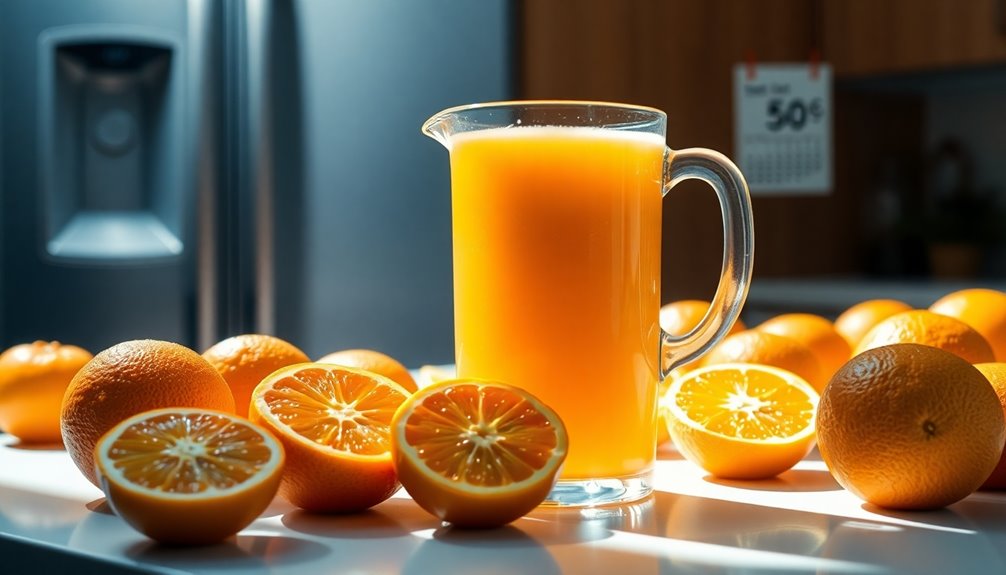
While making homemade orange juice can be a delightful way to enjoy fresh flavors, it's essential to consider safety aspects to avoid health risks. Unpasteurized juice can harbor harmful pathogens like E. coli and Salmonella, posing serious risks, especially to young children, pregnant individuals, and those with weakened immune systems. Pasteurization is the most effective method to eliminate these pathogens and ensure the juice is safe for consumption.
To minimize contamination, wash your hands, fruits, and all equipment thoroughly before juicing. Rinse fruits under running water and sanitize your juicing tools to keep bacteria at bay.
Freshly squeezed juice should be consumed immediately or stored properly in the refrigerator, where it lasts about 2-3 days. Always discard juice that tastes off, as spoilage can lead to severe health issues.
Prioritizing safety ensures you enjoy your juice worry-free!
Alternatives for Extending Shelf Life

To keep your homemade orange juice fresh for longer, you have several effective alternatives at your disposal.
First, refrigeration is key; store your juice in airtight glass containers at a consistent temperature between 35-40°F (1. 6-4. 4°C). Adding citric acid or lemon juice can further extend its life by delaying oxidation. Fresh fruit and vegetable juice typically lasts up to three days in the refrigerator, so consume it promptly for the best flavor. To maximize the freshness of your juice, consider consuming it within the first day for optimal taste and nutritional value. Additionally, incorporating lime juice as a natural preservative can enhance flavor while contributing to the juice’s longevity. However, it is essential to note the lime juice storage duration, as it may vary slightly depending on the acidity level and the overall composition of your juice mixture.
If you want to go longer, freezing is an excellent option, allowing juice to last up to six months. Portion it into small containers, leaving space for expansion.
For advanced storage, consider vacuum sealing, which can extend freshness by removing air. Always label your containers with the date to track freshness effectively.
These methods help you enjoy your homemade juice at its best for as long as possible.
Frequently Asked Questions
Can I Mix Different Citrus Juices for Better Flavor?
Yes, you can absolutely mix different citrus juices for better flavor!
Combining juices like orange and lemon creates a balanced taste, while adding lime can introduce an exciting tartness.
Experiment with various combinations, such as blood orange with ginger or mandarin with vanilla, to discover unique blends you love.
Just remember to balance sweetness and acidity for optimal flavor, and don't hesitate to add herbs or spices for an extra kick!
How Can I Tell if Orange Juice Has Gone Bad?
Imagine pouring a glass of orange juice, only to be hit by a sour odor.
That's your first sign it's gone bad.
Check for visual indicators like dark spots or cloudiness.
If you notice an unusual texture or taste, it's best to toss it.
A bloated container? That's fermentation at work.
Always trust your senses—if anything seems off, don't risk it; dispose of the juice to stay safe.
Does Orange Juice Lose Nutrients When Frozen?
When you freeze orange juice, it doesn't lose significant nutrients like Vitamin C. However, you might notice a decrease in citric acid, which can affect the taste.
The freezing process also changes the juice's texture due to cell damage, and while it retains most soluble solids, the sucrose levels drop.
Can I Use Orange Juice in Recipes After Freezing?
Think of frozen orange juice like a time capsule of summer.
Yes, you can absolutely use it in recipes after freezing! Whether you're making a refreshing smoothie or a tangy marinade, thawed orange juice brings vibrant flavor.
Just remember, once it's thawed, use it within a week for the best taste.
Is It Safe to Consume Orange Juice After the Expiration Date?
It's not safe to consume orange juice after its expiration date.
Even if it looks and smells fine, harmful bacteria might still be present.
While commercial juices with preservatives may last longer, they can lose flavor over time.
Always perform sensory checks—look for cloudiness, off flavors, or an unusual smell.
If you're unsure, it's better to toss it out and avoid potential health risks.
Trust your instincts when it comes to food safety!
Conclusion
In the end, savoring a glass of freshly squeezed orange juice is like capturing sunshine in a cup. However, to keep that vibrant taste alive, remember to store it properly and enjoy it within a few days. Picture yourself sipping that zesty elixir, knowing you're getting all the nutrients your body craves. With a few simple precautions, you can extend its delightful freshness and make every sip as refreshing as the first.
Cindy thoroughly researches juicing trends, techniques, and recipes to provide readers with practical advice and inspiration. Her writing style is accessible, engaging, and designed to make complex concepts easy to understand. Cindy’s dedication to promoting the advantages of juicing shines through her work, empowering readers to make positive changes in their lives through the simple act of juicing.









